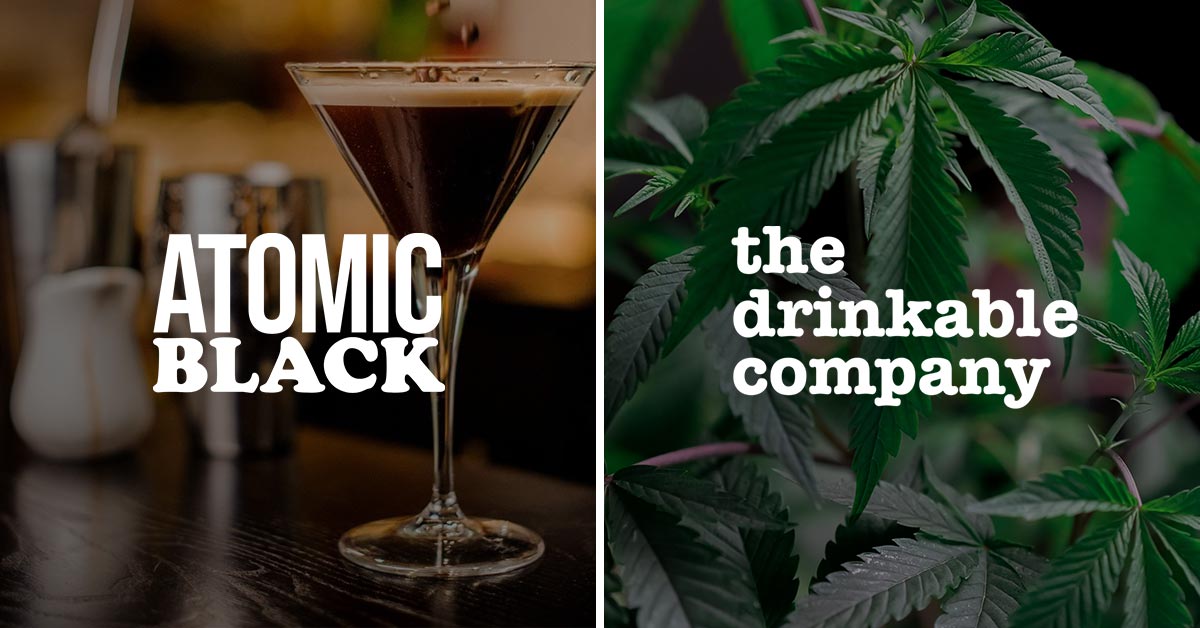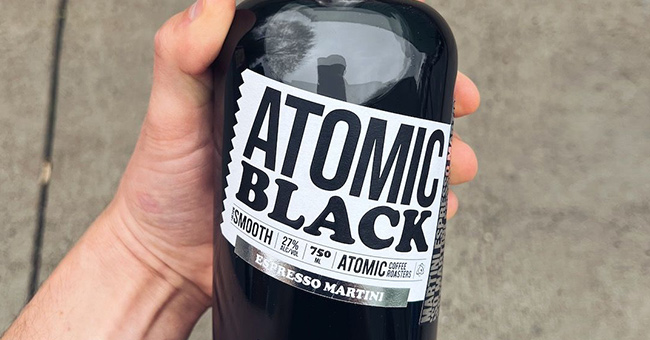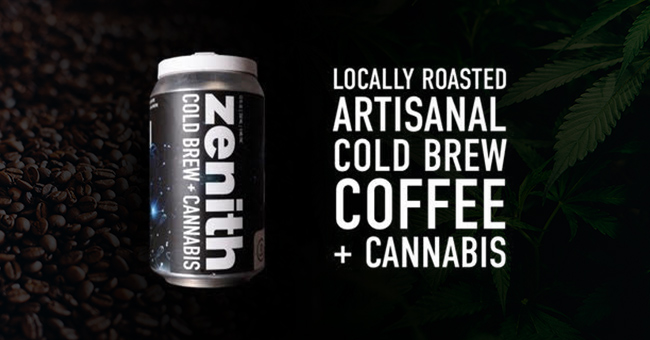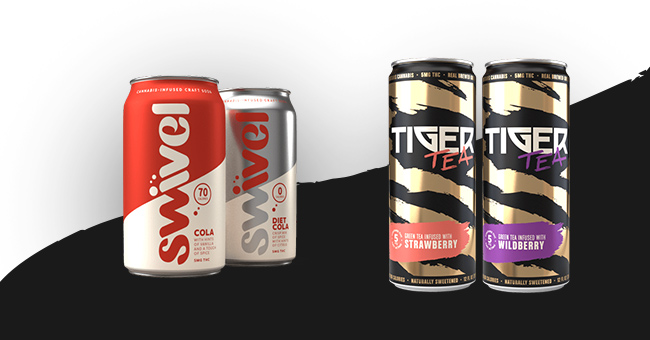Mark Mahoney has launched numerous brands spanning a wide range of categories across a nearly 40-year career in the beverage business, but last Friday may have been his Super Bowl.
In a move reflective of his ambitions for both businesses, last week Mahoney and his team pulled off multiple simultaneous launches in bringing Atomic Coffee’s new line of espresso martinis to market alongside rolling out the first releases from his nascent cannabis beverage venture The Drinkable Company. It took a whole new level of focus and, likely, a few extra cups of coffee.
“I have to give credit to my team,” said Mahoney. “I consider myself a forward looking person, I’m good at vision, but I’m not great at execution, [but] my two sons that I brought into Atomic are amazing at that.”
The Atomic Coffee Roasters team – which is made up of Mahoney’s two sons, Spencer (VP of Operations) and Logan (VP of Sales) as well as COO Brendan Burke and approximately 30 additional employees – executed the launch of a new sub-brand, Atomic Black Spirits, with an inaugural cold brew-based Espresso Martini containing vodka and 27% ABV. The team was also supported by Jack Stewart, a longtime friend of the Mahoney’s who also served as Northeast sales director for two of Mark’s previous businesses.
Mahoney said he has been working toward creating this product since he first tried Starbucks’ now discontinued coffee liquors nearly two decades ago. He was given an early taste of the product by Rolie Zagnoli, a longtime friend and food and beverage executive and had been pressing the Massachusetts-based Atomic team to consider the idea since acquiring a majority stake five years ago.
“Those were a gold standard in this category [at the time] because everyone else was using a coffee extract, a coffee flavor, freeze dried coffee, a ton of sugar, a dairy component, and all sorts of artificial ingredients or preservatives,” said Mahoney. “I think after two years they discontinued it… [but] that always stuck in my mind.”
He said Atomic Black seeks to capture the simplicity of that product and position itself within the current “fourth coffee wave.” The brand has plans to add a rum-based coffee liqueur to its lineup and, while he could not confirm details yet, Mahoney said the team is also playing with RTD canned cold brew cocktail formulations.
“We could have gone in a different direction, but we decided that because we have some IP on extraction for cold brew – our cold brew is less acidic [we wanted to use that],” explained Mahoney. “When you taste our Espresso Martini or the upcoming rum cold brew liquor, it’s got much less acidity and harshness to it. We wanted to make sure that it was a coffee forward beverage, not the boozy, sweet products which are what most of our competitors rely on.”
The spirits brand will focus primarily on the Massachusetts market with distribution through Martignetti. The line has already secured distribution at all Kappy’s liquor stores, received orders from 45 retail and package stores spanning “Newburyport through Cape Cod,” and is available for between $24.99 to 27.99, depending on the retailer. Atomic Black is also working to establish a presence in alternative channels including a partnership with Vinwood Catering, one of the state’s largest caterers, and has been brought on by dining and entertainment venue Kings Bowling.
Canned Cold Brew Reaches A New High
Concurrent with Atomic Black’s launch, Mahoney’s other beverage business – The Drinkable Company – unveiled its joint venture last week with Gloucester, Massachusetts-based cannabis cultivators Ocean Breeze to bring a cold brew can to market carrying slightly higher expectations.
Cannabis-infused Zenith Cold Brew sold out within its first weekend, exceeding total sales expectations by 50%, according to Mahoney. The brand has locked in 30 dispensary retail partners over the past week and is aiming to be in over 100 locations by early July. The product contains 5 mg of a sativa-leaning cannabis, combined with Atomic’s signature cold brew.
But that’s not all – the company is looking to play in multiple categories from the start. Over the upcoming week, Drinkable will activate a second joint venture, this time with cannabis company Sweet Dirt in Maine, to bring Zenith as well as two other cannabis beverage brands – Tiger Tea and Swivel Soda – to Maine. This quick expansion will allow Drinkable to begin building brand awareness without venturing too far from home.
“We love Maine because it’s a contiguous state,” explained Mahoney. “It’s got a great population that’s coming from all over for the beach and skiing. We’ll also be able to service our customer base from Massachusetts that [travel] up there.”
So far, The Drinkable Company is focusing on low-dose, sessionable versions of familiar favorites. Green tea-based Tiger Tea is naturally sweetened, comes in Wildberry and Strawberry flavors and features 5 mg THC per 12 oz. can. Swivel Soda comes in three flavors – Cola, Diet Cola and Orange – and seeks to replicate craft soda with hints of spices, vanilla or citrus, depending on the flavor. The product also contains 5 mg of THC and less than 100 calories per 12 oz. can. According to Mahoney, next up on the innovation pipeline is a cannabis-infused beer.
“I’ve never seen an opportunity this large in a category that doesn’t have experienced players specifically for beverage,” said Mahoney. “Our pitch at the beginning was – there are a lot of people in cannabis that want to do beverages, we’re beverage experts that are doing cannabis. For us, the distillate that we add is just a component.”
Instead, creating “repeatable, safe, great” beverages that are also “crave-able” will be key to success in this market, he said. That is a key reason behind the company’s network of JVs.
By partnering with established cultivators, who already hold licenses for growing, processing, manufacturing and distributing cannabis, Mahoney can instead focus on the liquid itself. However, at a time many cannabis beverage brands are turning to hemp-derived cannabinoids like Delta-8 and Delta-9 THC to build brand awareness in states where cannabis is still illegal, Mahoney said Drinkable is not planning to go that route.
The team has also built out a pilot production line for the business within Atomic’s production facility where they have created and tested the beverage formulations (without the cannabis infusion) so that food safety and shelf life stability testing could run contingent to the business’ development and expedite the products’ route to market.
“I’ve been doing this for almost 40 years now and the one thing I really pulled out of the cannabis business is there are no straight lines,” said Mahoney. “This definitely was the most challenging beverage launch I’ve ever done.”
The Drinkable Company raised an oversubscribed funding round earlier this year and while he would not disclose the final sum Mahoney noted “it’s millions of dollars, that’s all I’d like to say.” The company also has a partnership ready to activate in New York with Circona Labs by early July and is looking to enter Connecticut and Vermont next.
While the scope of opportunity in cannabis beverage continues to grow, so does competition. By laying the groundwork now in the company’s own backyard, Mahoney believes Drinkable will eventually begin activating with co-packers when it looks beyond the Northeast. But for now, Mahoney is focused on taking a “thoughtful, methodical” approach towards building strong brand foundations on a manageable scale.
“You can have a business and be very successful in your own backyard,” said Mahoney. “We looked at this and said, ‘let’s not go crazy and go out and raise $20 million to try to open 10 different states up and get licenses.”



